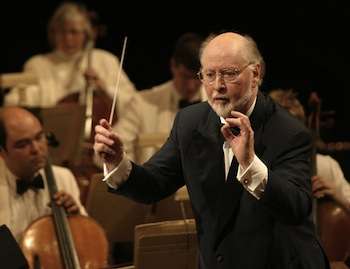John Williams

John Williams: You need a better composer than I am for this film.
Steven Spielberg: I know. But they're all dead!—Regarding Schindler's List
John Williams (February 8, 1932) is one of the world's most famous movie composers and has been nominated for 47 Oscars (winning five), six Emmy nominations (winning three), 22 Golden Globes (winning four) and 59 Grammys (winning twenty). Only Walt Disney has been nominated for more Academy Awards, with John Williams currently holding the record for most nominated living individual.
Williams composes music in a Wagnerian style, using 19th-century Romanticism as his milieu. His scores make extremely liberal use of Leitmotif—practically every major character and concept has its own musical motif woven into the score. Williams is also fond of the Fanfare.
When a Williams composition is playing, you will generally be in for a good movie. If the movie's not good, and that's happened, well, the music will be.
You'll have certainly heard one of Williams' tunes. Most of his themes have become iconic in their own right, such as the famous string sting from Jaws or the theme for Indiana Jones. Williams has long been the go-to composer for Steven Spielberg's films.
Interestingly, many fans of classical music actually hold Williams in rather low regard, as many elements of his compositions (including some of his most well-known themes and motifs) are borrowed from older pieces of music. Though even they admit he's less guilty of this than others.
Among his most famous scores are:
- Jaws (duh duh, duh duh...)
- Star Wars, "Luke's Theme" from all six films, "The Imperial March (Darth Vader's Theme)" and "Duel of The Fates" are the best known.
- Close Encounters of the Third Kind
- Superman
- The Indiana Jones films
- E.T. the Extra-Terrestrial
- Home Alone
- Jurassic Park
- Schindler's List
- The first three Harry Potter films, although the main themes he composed are still used in the latter films.
In addition to his film scores, Williams has composed music for four Olympic Games, The Mission suite for the NBC Nightly News and the inauguration of President Barack Obama, among many others. He was also conductor for the Boston Pops Orchestra from 1980-1993.
Early in his career, Williams worked for producer Irwin Allen (under the name "Johnny Williams"), providing the music for Allen's TV series Lost in Space, The Time Tunnel and Land of the Giants, and such disaster films as The Poseidon Adventure and The Towering Inferno.
He is also the man.
- Associated Composer: One of the greatest examples.
- Award Bait Song: It goes without saying.
- Bootstrapped Theme: The "Star Wars Main Theme" was originally intended to be purely "Luke's Theme", though it became so synonymous with the series as a whole, Williams forewent creating a new main theme for the Prequels, and even included the theme in several places in the Prequel scores.
- Williams originally scored the scene where Luke looks out to the double sunset with his theme but George Lucas suggested he use the theme he wrote for Obi-Wan instead. Williams complied and now it is known as "Binary Sunset" and used for any scene involving the Force.
- "Hedwig's Theme" has ended up being the theme of the whole Harry Potter series.
- Cool Old Guy: He's 80 years old yet he's still composing scores for Steven Spielberg.
- Fanfare: He's so good, he's gotten raves from the directors just from watching him conduct. Richard Donner even admitted he screwed up a recording take for Superman by running into the room shouting how great it was.
- Leitmotif
- Old Master: Again, he's 80 years old, yet he still showed much younger composers why he's the Maestro who took the world of film music by storm back in the 70's with the releases of War Horse and The Adventures of Tintin.
- Shout-Out: The soundtrack of Star Wars strongly references Gustav Holst's The Planets. Does this remind you of anything?
- As sort of a self Shout-Out, Williams uses few notes of the music he composed for the first Harry Potter film in one of the final scenes of Revenge of the Sith. Fitting, since both scenes involved an infant with great potential being left with relatives after the death of their mother.